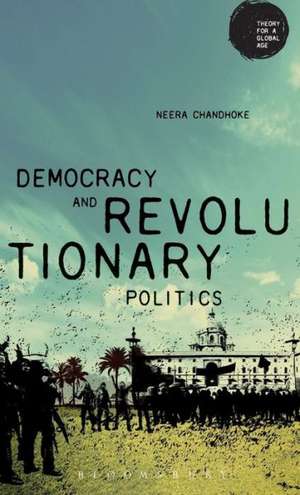Democracy and Revolutionary Politics: Theory for a Global Age Series
Autor Neera Chandhokeen Limba Engleză Hardback – 25 feb 2015
Preț: 771.10 lei
Preț vechi: 1050.13 lei
-27% Nou
Puncte Express: 1157
Preț estimativ în valută:
147.57€ • 160.24$ • 123.96£
147.57€ • 160.24$ • 123.96£
Carte tipărită la comandă
Livrare economică 22 aprilie-06 mai
Preluare comenzi: 021 569.72.76
Specificații
ISBN-13: 9781474224000
ISBN-10: 1474224008
Pagini: 192
Ilustrații: 1 maps
Dimensiuni: 138 x 216 x 13 mm
Greutate: 0.37 kg
Editura: Bloomsbury Publishing
Colecția Bloomsbury Academic
Seria Theory for a Global Age Series
Locul publicării:London, United Kingdom
ISBN-10: 1474224008
Pagini: 192
Ilustrații: 1 maps
Dimensiuni: 138 x 216 x 13 mm
Greutate: 0.37 kg
Editura: Bloomsbury Publishing
Colecția Bloomsbury Academic
Seria Theory for a Global Age Series
Locul publicării:London, United Kingdom
Caracteristici
Adds a global perspective to the debate surrounding revolutionary violence, informed by the broader impact of globalization on the social sciences
Notă biografică
Neera Chandhoke, formerly Professor of Political Science at the University of Delhi, India.
Cuprins
Introduction1. Democracy and Revolutionary Violence2. What is it We Speak of When We Speak of Violence?3. The Biography of Revolutionary Violence in India5. Can Revolutionary Violence be Justified?6. Ambiguities of ViolenceConclusionNotesIndex
Recenzii
Through a sophisticated, robust and wide ranging analysis of democratic movements, Chandhoke urges us to rethink the debates on civil society, the state and violence in the global south. This is an important, thought-provoking and challenging book that will influence the thinking of all of us who are interested in questions of political and social justice.
Neera Chandhoke's Democracy and Revolutionary Politics provides a much-needed, careful and imaginative analysis of the ambivalent concept of revolutionary violence. Both with respect to its explanatory and its normative power, combining social context and general principles, it is an exemplary work - political theory at its best.
Neera Chandhoke's Democracy and Revolutionary Politics provides a much-needed, careful and imaginative analysis of the ambivalent concept of revolutionary violence. Both with respect to its explanatory and its normative power, combining social context and general principles, it is an exemplary work - political theory at its best.






